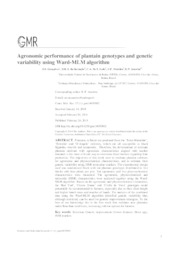Agronomic performance of plantain genotypes and genetic variability using Ward-MLM algorithm.
Agronomic performance of plantain genotypes and genetic variability using Ward-MLM algorithm.
Autoria: GONÇALVES, Z. S.; INVENÇÃO, D. R. S. DA; LEDO, C. A. da S.; FERREIRA, C. F.; AMORIM, E. P.
Resumo: Plantains in Brazil are produced from the `Terra Maranhão?, ?Terrinha? and ?D´Angola? cultivars, which are all susceptible to black Sigatoka, weevils and nematodes. Therefore, the development of resistant plantain cultivars with agronomic characteristics aligned with market demands is the most efficient way to overcome these barriers regarding fruit production. The objectives of this work were to evaluate plantain cultivars for agronomic and physicochemical characteristics, and to estimate their genetic variability using ISSR molecular markers. The experimental design used was randomized block with ten plantain genotypes distributed in five blocks with four plants per plot. Ten agronomic and five physicochemical characteristics were measured. The agronomic, physicochemical and molecular (ISSR) characteristics were analyzed together using the Ward-MLM algorithm. Based on the agronomic and physicochemical evaluations, the ?Red Yad?, ?Curare Enano? and ?Chifre de Vaca? genotypes could potentially be recommended to farmers, especially due to their short height and higher bunch mass and number of hands. The analysis of the combined data using the Ward-MLM algorithm identified genetic variability that, although restricted, can be used for genetic improvement strategies. To the best of our knowledge this is the first work that validates new plantains under Brazilian conditions, increasing cultivar options for farmers.
Ano de publicação: 2018
Tipo de publicação: Artigo de periódico
Unidade: Embrapa Mandioca e Fruticultura
Palavras-chave: Banana, Plantains (fruit), Plátano
Observações
1 - Por padrão são exibidas publicações dos últimos 20 anos. Para encontrar publicações mais antigas, configure o filtro ano de publicação, colocando o ano a partir do qual você deseja encontrar publicações. O filtro está na coluna da esquerda na busca acima.
2 - Para ler algumas publicações da Embrapa (apenas as que estão em formato ePub), é necessário ter, no celular ou computador, um desses softwares gratuitos. Sistemas Android: Google Play Livros; IOS: iBooks; Windows e Linux: software Calibre.
Acesse outras publicações
Acesse a Base de Dados da Pesquisa Agropecuária (BDPA) para consultar o acervo completo das bibliotecas da Embrapa.

